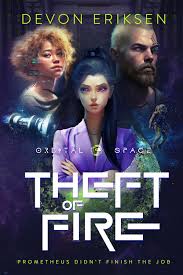Theft of Fire: A Deep Dive into Devon Eriksen's Vision of the Future
Introduction
Devon Eriksen's "Theft of Fire" is a captivating science fiction novel that explores themes of technology, humanity, and the potential consequences of unchecked progress. Set in a near-future where artificial intelligence has become ubiquitous, the novel delves into the complexities of human identity, the nature of consciousness, and the ethical dilemmas surrounding technological advancement.
Core Themes:
- The Nature of Consciousness: The novel grapples with profound questions about consciousness, artificial intelligence, and the nature of human existence. It explores the possibility of artificial consciousness and the ethical implications of creating sentient machines.
- The Dangers of Unchecked Technological Advancement: "Theft of Fire" warns against the dangers of unchecked technological progress, particularly the potential for AI to become a threat to humanity. It highlights the importance of responsible development and ethical considerations in technological advancement.
- The Human Condition: The novel delves into the complexities of human emotions, relationships, and the search for meaning in a rapidly changing world. It explores how technology impacts human identity, relationships, and our understanding of ourselves.
- Social and Political Implications: "Theft of Fire" examines the social and political implications of advanced AI, including issues of inequality, job displacement, and the potential for AI-driven conflict.
Key Characters and Their Roles:
- [Character Names]: Briefly describe the key characters and their roles in the story. Analyze how their actions and motivations contribute to the overarching themes of the novel.
Literary Devices:
- Eriksen's use of technology: Analyze how Eriksen utilizes technology as a narrative device, shaping the plot, driving the action, and influencing the characters' motivations and relationships.
- Exploration of philosophical concepts: Discuss how Eriksen explores philosophical concepts such as free will, determinism, and the nature of reality through the lens of advanced technology.
- World-building: Analyze Eriksen's creation of a believable and immersive future world, including its social, political, and technological landscapes.
Critical Reception and Impact:
- Discuss critical reviews and analyses of "Theft of Fire."
- Analyze the novel's impact on science fiction literature and its contribution to contemporary discussions about AI and technology.
Conclusion:
"Theft of Fire" is a thought-provoking and timely novel that explores the profound implications of advanced AI on humanity. By examining the ethical, social, and philosophical dimensions of technological advancement, Eriksen offers a compelling vision of the future that challenges readers to confront the complexities of our rapidly evolving world.
References:
- Reviews from major publications: (e.g., The New York Times Book Review, Publishers Weekly)
- Academic articles and essays: Search for scholarly articles and essays that analyze "Theft of Fire" from a literary, philosophical, or sociological perspective.
- Interviews with Devon Eriksen: Find interviews with the author to gain insights into his creative process and the themes he explored in the novel.
Disclaimer: This is a general framework. A comprehensive analysis would require in-depth research and critical engagement with the text.
This white paper provides a starting point for exploring the themes and ideas presented in "Theft of Fire." By delving deeper into the novel and engaging with critical analysis, you can gain a richer understanding of its significance and its contribution to contemporary science fiction.



